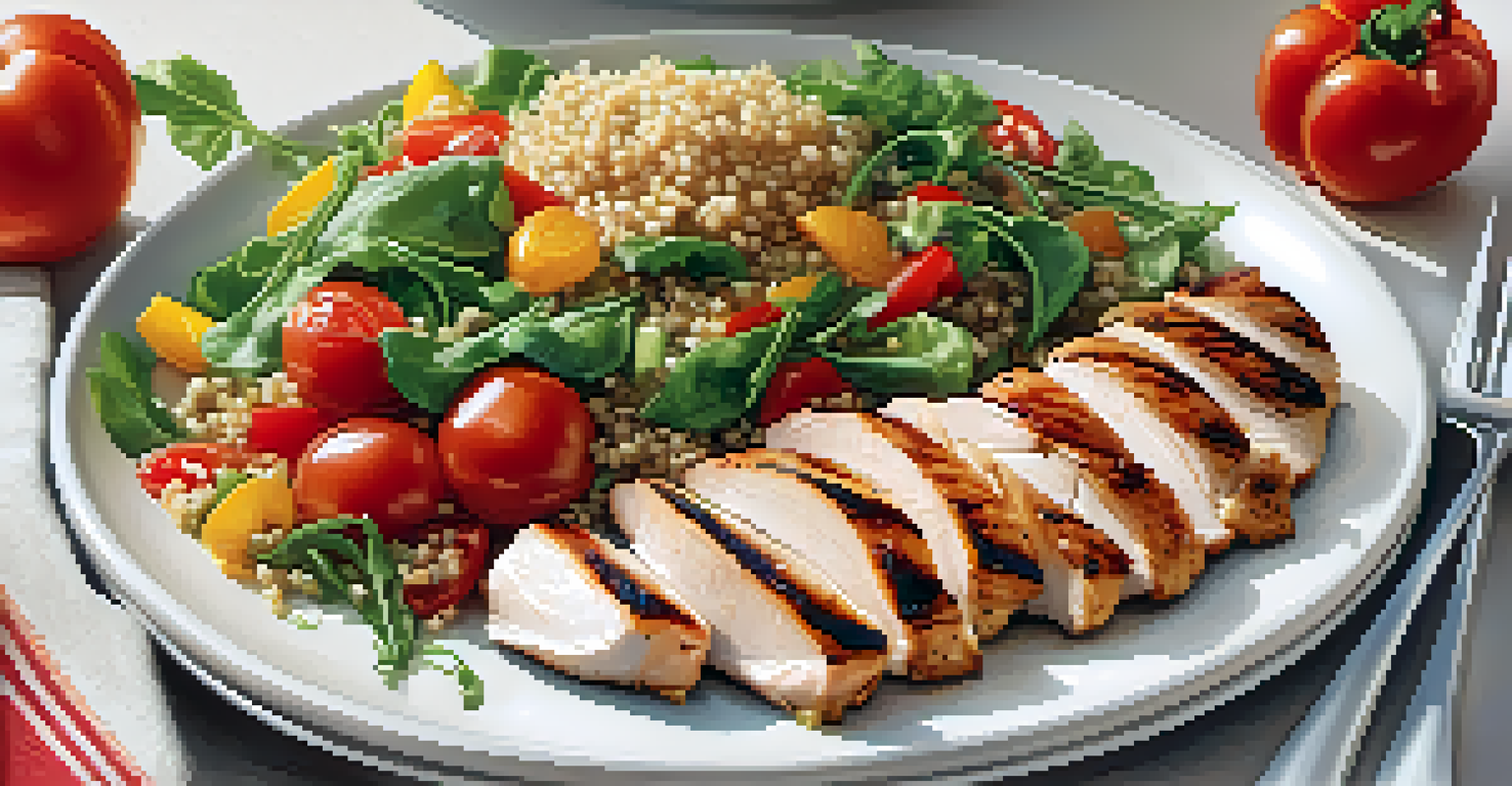Understanding Micronutrients: Vitamins and Minerals for Bodybuilders

What Are Micronutrients and Why They Matter
Micronutrients encompass vitamins and minerals that our bodies need in small amounts, yet they play a crucial role in overall health. Unlike macronutrients like carbohydrates, proteins, and fats, micronutrients help regulate various bodily functions, including metabolism and immune response. For bodybuilders, these nutrients are essential not just for recovery, but also for maximizing performance and muscle growth.
Let food be thy medicine and medicine be thy food.
Think of micronutrients as the tiny gears in a machine that keep everything running smoothly. If even one gear is missing, the machine can malfunction, just like your body can struggle without adequate vitamins and minerals. By understanding their importance, bodybuilders can better tailor their diets to meet their nutritional needs.
Incorporating a variety of fruits, vegetables, nuts, and whole grains into your diet can ensure you get a broad spectrum of these essential nutrients. Remember, quality matters, so focus on whole foods rather than supplements whenever possible.
Essential Vitamins for Bodybuilders
Vitamins are organic compounds that are crucial for various biochemical processes in the body. For bodybuilders, vitamins like Vitamin D, C, and the B-complex group are particularly important. Vitamin D, for instance, aids in calcium absorption and muscle function, while Vitamin C contributes to collagen synthesis, essential for joint and tissue health.

B vitamins, on the other hand, play a pivotal role in energy production and red blood cell formation. This is vital for bodybuilders, as increased energy levels can lead to more effective workouts and quicker recovery times. Ensuring adequate intake of these vitamins can significantly enhance your performance and recovery.
Micronutrients Fuel Bodybuilders
Vitamins and minerals are essential for muscle function, recovery, and overall health in bodybuilders.
A well-rounded diet that includes leafy greens, citrus fruits, eggs, and whole grains can help you meet your vitamin needs. However, if you suspect you’re lacking in certain vitamins, consulting a healthcare professional can help guide your supplement choices.
Key Minerals for Optimal Performance
Minerals such as calcium, potassium, magnesium, and zinc are critical for muscle function and overall health. Calcium is essential for muscle contractions and bone health, while potassium helps regulate fluid balance and muscle contractions. For bodybuilders, maintaining these minerals is vital to prevent cramps and enhance performance during workouts.
The body is a temple, but only if you treat it as one.
Magnesium also plays a key role, as it supports muscle recovery and energy production. Zinc, on the other hand, is important for protein synthesis and immune function, which is crucial for athletes undergoing intense training. Without these minerals, bodybuilders may experience fatigue or slower recovery times.
Incorporating sources like dairy products, bananas, nuts, and lean meats into your diet can help you achieve the recommended daily intake of these essential minerals. Remember, balance is key—too much of certain minerals can also have negative effects.
The Role of Antioxidants in Muscle Recovery
Antioxidants, which include vitamins A, C, and E, help combat oxidative stress caused by intense workouts. When you push your body to the limit, free radicals are produced, which can lead to muscle fatigue and delayed recovery. Antioxidants neutralize these free radicals, promoting quicker recovery and reducing soreness.
Including antioxidant-rich foods like berries, nuts, and dark chocolate can significantly enhance your recovery process. This is especially important for bodybuilders who train frequently and need to stay on top of their game. By incorporating these foods into your diet, you can help your body bounce back faster after strenuous workouts.
Micronutrients Boost Bodybuilding
Essential vitamins and minerals are crucial for muscle function, recovery, and overall health in bodybuilders.
Moreover, a diet rich in antioxidants can also support immune health, keeping you in peak condition and less prone to illness. This is essential for maintaining a consistent training schedule and achieving your bodybuilding goals.
Hydration and Its Importance for Nutrient Absorption
While often overlooked, hydration is crucial for optimal nutrient absorption and overall performance. Water helps transport vitamins and minerals throughout the body, ensuring that they reach their intended destinations where they are needed most. For bodybuilders, staying hydrated can mean the difference between a productive workout and feeling sluggish.
Dehydration can impair muscle recovery, reduce strength, and even lead to cramping during workouts. It’s essential to drink enough fluids before, during, and after your training sessions to support your body's needs. Aim for at least 8-10 glasses of water a day, adjusting based on your activity level and climate.
Incorporating water-rich foods, such as fruits and vegetables, can also improve your hydration status while providing additional vitamins and minerals. Remember, hydration is not just about drinking water—it's about creating a balanced approach to your overall nutrition.
How to Assess Your Micronutrient Needs
Understanding your specific micronutrient needs can be a game-changer for your bodybuilding journey. Factors like age, gender, training intensity, and dietary restrictions all play a role in determining what your body requires. Keeping a food diary can help you identify any gaps in your micronutrient intake and make adjustments as needed.
Consulting a registered dietitian or a nutritionist can provide personalized insights and help you create a balanced meal plan tailored to your goals. They can also recommend appropriate supplements if necessary, ensuring you meet your micronutrient needs without exceeding them.
Hydration Supports Nutrient Absorption
Staying hydrated is vital for transporting nutrients effectively and enhancing workout performance.
Regular check-ups and blood tests can also help monitor your micronutrient levels. This proactive approach ensures you're not just guessing about your nutrition but are making informed decisions to support your bodybuilding aspirations.
Common Micronutrient Deficiencies in Bodybuilders
Despite the best intentions, many bodybuilders may still encounter micronutrient deficiencies. Common culprits include Vitamin D, magnesium, and iron, which can affect energy levels, muscle function, and overall performance. These deficiencies can arise from restrictive diets or improper food choices, making it crucial to pay attention to your nutritional intake.
For instance, if you're primarily consuming protein shakes and neglecting whole foods, you might miss out on essential vitamins and minerals. This can lead to fatigue and hinder your progress in the gym. Recognizing these potential gaps is the first step toward making healthier choices.

Incorporating a diverse range of foods and considering supplementation when necessary can help you combat deficiencies. Always remember, knowledge is power—staying informed about your micronutrient status can lead to better training outcomes and improved overall health.